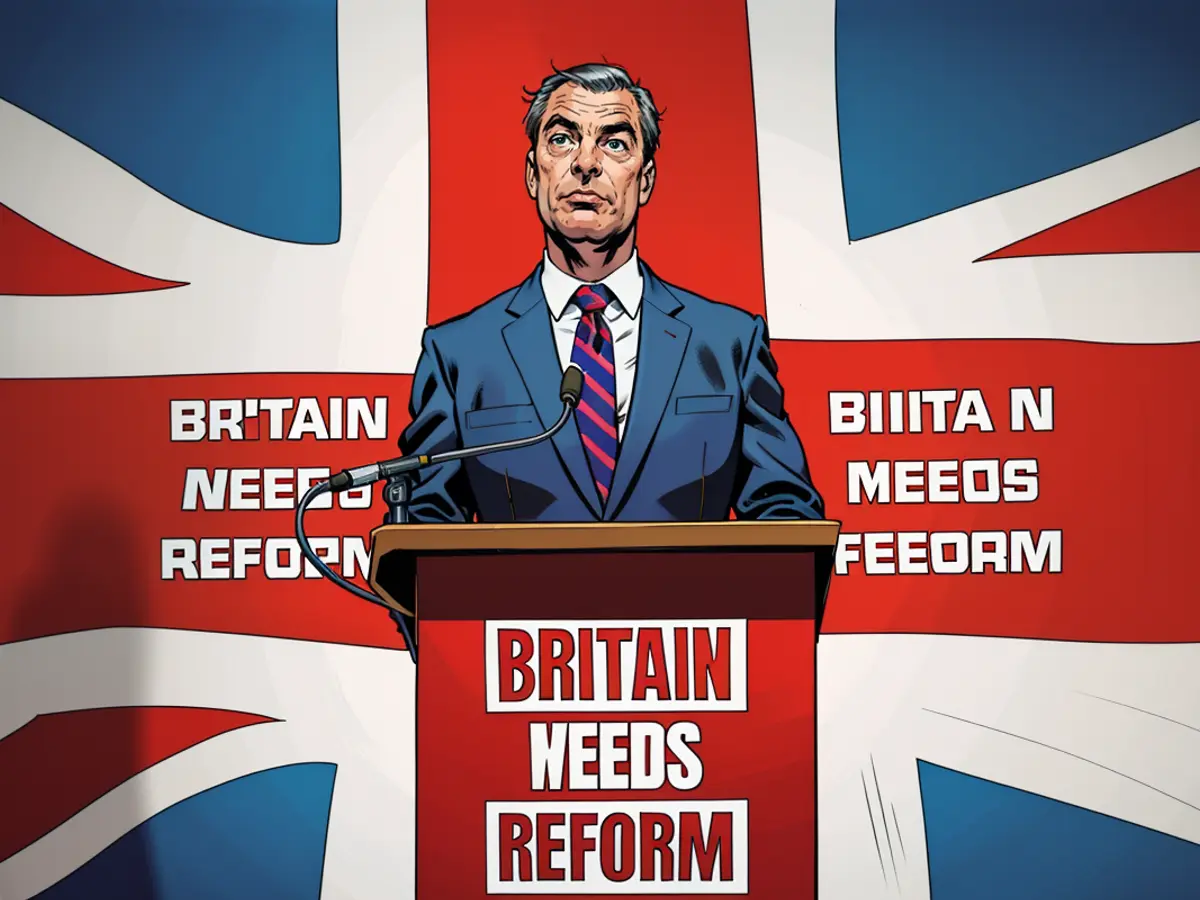Young individuals across Europe entertain a growing interest in far-right ideologies.
Pollsters are now taken aback by a novel tendency. The surprising performance of far-right parties has been evident in this month's European Parliament elections, particularly among the youth. Traditionally liberal and progressive, the youth, known as "Generation Climate," were previously voting mostly for green parties. However, their votes have recently helped far-right parties secure a quarter of seats in Brussels. What caused this shift?
Perhaps the "left behind" phenomenon is not merely spatial but generational. Gen-Z (individuals born between 1995 and 2012) has endured multiple crises, starting with the financial crisis, followed by the eurozone crisis, the pandemic crisis, and the ongoing war in Europe. A growing number of young people feel they will face harder lives than their parents. Isn't a generation left behind any less susceptible to the appeal of populism than left-behind locations?
Roberto Foa, co-director of the Centre for the Future of Democracy at the University of Cambridge, an expert on youth dissatisfaction with democracy, sees "two major divisions" in Western societies: "The wealth gap between economically prosperous and left-behind regions, and the intergenerational divide in life opportunities."
Political scientists might have underestimated both these groups because they've been disconnected for long. But their apathy is turning into antipathy – a desire, once more, to challenge the system. "If you're a political entrepreneur seeking to disrupt the established party system, these are your target groups," Foa told CNN. This trend, he believes, has been a long time in the making: "I'm amazed that people are still taken aback."
Young support for far-right parties is evident across several European countries. In Germany, the Alternative for Germany (AfD) garnered 16% of the under-25 vote in the EU elections, nearly tripling its share in that demographic compared to the 2019 vote. Among French voters under 34, the National Rally (RN) was the most popular party, capturing 32% of the vote - a 10-point increase compared to 2019. In Poland, 30% of under-30 voters backed the far-right Confederation party, an upward swing from 18.5% in 2019. Far-right parties also witnessed an uptick in support in the Netherlands, Spain, Portugal, Austria, and continued to perform well in Italy.
How alarmed – and surprised – should mainstream parties be?
Age, not locale
Consider these policy proposals. Young people will be exempt from income tax, and businesses they establish will be exempt from corporation tax for five years. The state will subsidize part-time jobs for students and construct 100,000 units of student housing. They will also travel by train for free.
You'd assume this agenda belongs to the far left. But it isn't: This was Marine Le Pen's plan for the 2022 French presidential election, which she narrowly lost. Young people, predictably, loved it. Close to 50% of 25-34-year-olds who cast a vote supported Le Pen, compared to just 41% of the overall population and 29% of voters above 70. While the "gray vote" propelled Donald Trump to the White House and the UK out of the EU, it kept the French far right at bay.

This might soon change. After his Renaissance party suffered a defeat at the hands of the far-right in the EU elections, President Emmanuel Macron called for a snap parliamentary election, which could lead to Jordan Bardella, the RN's 28-year-old leader, becoming France's prime minister next month.
Arthur Prevot, manager of the RN's youth wing in Paris, finds this development encouraging. According to him, Macron's presidency has failed to deliver for young people. "Purchasing power has declined dramatically over the past seven years. Between the 'yellow vest' crisis, the surge in fuel prices, and all the new taxes introduced – all of this impacts daily life, including mine," Prevot, 22, told CNN. His economic worries prompted him to join the party that might soon govern France, although Macron will remain president.
Jonathan Verbeken, a deputy RN candidate in Paris' 15th district, stated his main reason for joining the party was because, "we see people struggling daily, fighting to make ends meet. We witness a dismal state in France, specifically with security and immigration. We want to respond to that."
Many older voters remain terrified by the RN, despite its attempts to "normalize." Elder generations still remember its antisemitic, neofascist roots.
However, young voters appear less concerned by these roots, says Simon Schnetzer, author of a recent survey of Germany's youth. "Young people are new voters. They are a blank slate. What instigates their decisions the most is: Who can offer me what best fits my needs?" he told CNN.
The absence of historical burdens, coupled with the strange demise of center-left parties in many parts of Europe, has enabled the far right to appear respectable and armed with economic solutions to young people's problems.
Sarah-Lee Heinrichs, a 23-year-old politician for the German Green Party, stated that economic concerns have gained prominence among young people since the last European Parliament elections in 2019, when the Greens became the second largest party in Germany for the first time. In the aftermath of the pandemic, the full-scale war in Ukraine, and the return of high inflation, environmentalism is no longer young people's primary concern, she says.
If governments don't ensure decent employment and affordable housing, far-right extremism will rise, according to Heinrichs, as stated to CNN. The economic instability has fueled stronger opposition towards immigration, nearly a decade after the continent, particularly Germany, welcomed a large number of refugees escaping war in Syria.

Last month, a troubling trend started when a brief video showing well-dressed German youths shouting "Ausländer Raus!" ("foreigners out!") and "Deutschland den Deutschen!" ("Germany for Germans!") over a 1999 Eurodance beat was uploaded on X. This aggressive chant has since gained momentum across the country, particularly during the European soccer championships. The appeal isn't limited to Germans as even fans in Italy's stadium were heard chanting a similar tune during a match against Spain.
On the opposite side, the supply of extremist views is increasing. After their center-right alliance secured the most seats in the European Parliament, Ursula von der Leyen, the President of the European Commission, addressed the crowd in Brussels. She emphasized the importance of defending European principles, such as integration, democracy, and the rule of law.
However, these abstract concepts may not resonate with young voters. According to Schnetzer, young people would rather question if something helps them with their needs, entertains them, provides security, or is enjoyable. If it doesn't, they're likely to move on.
Meanwhile, Europe's mainstream is giving solemn speeches while the far-right is rapidly expanding its following on social media platform TikTok. The RN's Bardella shares videos of himself tasting wine and drinking shots, while AfD's Krah provides dating advice like "Don't watch porn, don't vote for the Greens."
Extremist figures like Nigel Farage, who is often referred to as the architect of Brexit, are enjoying success as well. He has made humorous videos, such as approaching a fruit store and commenting on the melons, which have gained millions of views. Farage appears to understand and exploit this burgeoning market. Recently, he praised misogynist online influencer Andrew Tate for being an "important voice" for "emasculated" young boys. Tate is facing charges for human trafficking and rape in Romania, which he denies.
Despite the confusion between politicians and entertainment, young voters are no longer distinguishing between the two. On TikTok, the distinction is just a swipe away, making it an influential platform for shaping opinions.
It remains uncertain how deep-rooted the far-right sympathies are among the youth. In a growing trend among young voters, loyalty towards political parties or ideologies is decreasing. They are unpredictable and may switch allegiances from one election to the next, similar to their support for green parties in 2019.
However, the surge in support for far-right parties could indicate a more alarming trend. In his study of youth dissatisfaction with democracy, Foa noticed a growing attraction to authoritarianism. With a lack of personal experience under authoritarian rule or the struggle to achieve democracy, young people are less enamored with the system than older generations.

The success of far-right parties should serve as a warning to Europe's mainstream. As Churchill famously said, "Democracy is the worst form of government, except for all the others," young people might question, "Really?"
Read also:
The far-right parties' growing popularity in Europe is not just limited to certain countries, as they have witnessed an uptick in support in several nations such as Germany, France, Poland, the Netherlands, Spain, Portugal, and Austria. Furthermore, the appeal of these parties extends beyond traditional supporters, with a significant portion of young voters, commonly known as "Generation Z," backing far-right parties in these elections.







